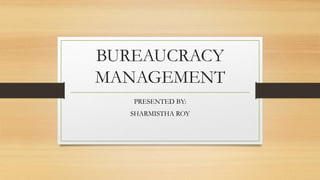Bureaucracy management
•Télécharger en tant que PPTX, PDF•
7 j'aime•4,957 vues
Bureaucracy management- definition,ancient & modern bureaucracy and theories
Signaler
Partager
Signaler
Partager

Recommandé
Recommandé
Contenu connexe
Tendances
Tendances (20)
Understanding Bureaucracy in Public Administration

Understanding Bureaucracy in Public Administration
SUMMARY OF THE COURSE ON THE THEORY OF PUBLIC ADMINISTRATION

SUMMARY OF THE COURSE ON THE THEORY OF PUBLIC ADMINISTRATION
Similaire à Bureaucracy management
Similaire à Bureaucracy management (20)
Public administration and the influences of the multi disciplinary

Public administration and the influences of the multi disciplinary
Plus de Business Management
Plus de Business Management (20)
Dernier
This presentation was provided by William Mattingly of the Smithsonian Institution, during the fourth segment of the NISO training series "AI & Prompt Design." Session Four: Structured Data and Assistants, was held on April 25, 2024.Mattingly "AI & Prompt Design: Structured Data, Assistants, & RAG"

Mattingly "AI & Prompt Design: Structured Data, Assistants, & RAG"National Information Standards Organization (NISO)
Mehran University Newsletter is a Quarterly Publication from Public Relations OfficeMehran University Newsletter Vol-X, Issue-I, 2024

Mehran University Newsletter Vol-X, Issue-I, 2024Mehran University of Engineering & Technology, Jamshoro
Dernier (20)
Mattingly "AI & Prompt Design: Structured Data, Assistants, & RAG"

Mattingly "AI & Prompt Design: Structured Data, Assistants, & RAG"
Ecological Succession. ( ECOSYSTEM, B. Pharmacy, 1st Year, Sem-II, Environmen...

Ecological Succession. ( ECOSYSTEM, B. Pharmacy, 1st Year, Sem-II, Environmen...
SECOND SEMESTER TOPIC COVERAGE SY 2023-2024 Trends, Networks, and Critical Th...

SECOND SEMESTER TOPIC COVERAGE SY 2023-2024 Trends, Networks, and Critical Th...
ICT Role in 21st Century Education & its Challenges.pptx

ICT Role in 21st Century Education & its Challenges.pptx
Unit-V; Pricing (Pharma Marketing Management).pptx

Unit-V; Pricing (Pharma Marketing Management).pptx
Presentation by Andreas Schleicher Tackling the School Absenteeism Crisis 30 ...

Presentation by Andreas Schleicher Tackling the School Absenteeism Crisis 30 ...
Measures of Central Tendency: Mean, Median and Mode

Measures of Central Tendency: Mean, Median and Mode
Bureaucracy management
- 2. DEFINITION • A body of non-elective government officials. • An administrative policy-making group.
- 3. ANCIENT BUREAUCRACY • The first definitive emergence of bureaucracy is in ancient Sumer, where an emergent class of scribes used clay tablets to administer the harvest and allocate its spoils. • After the Roman Empire split, the Byzantine Empire developed a notoriously complicated administrative hierarchy, and in time the term "byzantine" came to refer to any complex bureaucratic structure. • The imperial examination system lasted until 1905, six years before the collapse of the Qing Dynasty, marking the end of China's traditional bureaucratic system.
- 4. MODERN BUREAUCRACY • A modern form of bureaucracy evolved in the expanding Department of Excise in the United Kingdom, during the 18th century. • According to Niall Ferguson, the bureaucracy was based on "recruitment by examination, training, promotion on merit, regular salaries and pensions, and standardized procedures“. • Under Louis XIV of France, the old nobility had neither power nor political influence, the sum of their privileges being confined to their exemption from taxes.
- 5. • In the early 19th century, Napoleon attempted to reform the bureaucracies of France and other territories under his control by the imposition of the standardized Napoleonic Code. But paradoxically, this led to even further growth of the bureaucracy. • By the mid-19th century, bureaucratic forms of administration were firmly in place across the industrialized world. Thinkers like John Stuart Mill and Karl Marx began to theorize about the economic functions and power-structures of bureaucracy in contemporary life. • The 1980s brought a backlash against perceptions of "big government" and the associated bureaucracy. • In the modern world practically all organized institutions rely on bureaucratic systems to manage information, process and manage records, and administer complex systems and interrelationships in an increasingly globalized world, although the decline of paperwork and the widespread use of electronic databases is transforming the way bureaucracies function.
- 6. THEORIES OF BUREAUCRACY • KARL MARX: Karl Marx theorized about the role and function of bureaucracy in his Critique of Hegel's Philosophy of Right, published in 1843. In his Philosophy of Right, Hegel had supported the role of specialized officials in the role of public administration, although he never used the term "bureaucracy" himself. Marx by contrast was opposed to the bureaucracy. He saw the development of bureaucracy in government as a natural counterpart to the development of the corporation in private society.
- 7. THEORIES OF BUREAUCRACY • JOHN STUART MILL: Mill referred to bureaucracy as a distinct form of government, separate from representative democracy. • MAX WEBER: The German sociologist Max Weber described many ideal- typical forms of public administration, government, and business in his 1922 essay, The Nature, Conditions, and Development of Bureaucratic Herrschaft published in his magnum opus, Economy and Society. His critical study of the bureaucratisation of society became one of the most enduring parts of his work.
- 8. CONCLUSION • An organizational hierarchy is the arrangement of the organization by level of authority in reference to the levels above and below it. For example, a vice-president of marketing is below the company's president, at the same level as the company's vice president of sales, and above the supervisor of the company's social media department. Each level answers to the level above it, with the ultimate leader of the organization at the top.